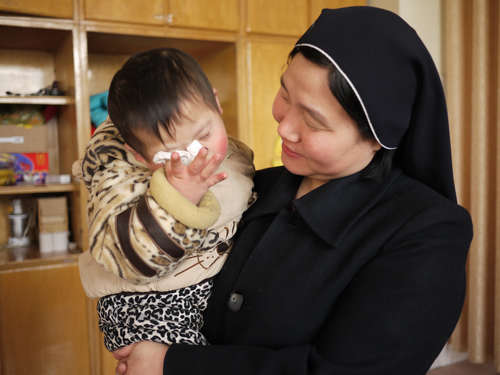
A Catholic nun and her team provide round-the-clock care for orphans with special needs at a Hubei village, Tom McGregor discovers.
Shi Junfang may appear similar to most young, Chinese single women in her 30s. She is hard working, loves chatting and telling jokes and exudes charm with a quick smile. Yet, her character is remarkable since she has devoted her life as a Catholic nun caring for disabled orphans in Biancun Village, a rural community in Central China's Hubei province.
She works with 17 other sisters of the St.Theresa of the Child Jesus order. They live at the Liming orphanage, which houses 130 of their charges.
Shi, known here as Sister Maria, must use all her energy to protect them from harm. The youngsters get proper education, eat nutritious meals and play in the courtyard on a regular schedule to promote and maintain healthy lifestyles.
The children suffer from debilitating illnesses and disabilities and need constant medical care. But most of all, Sister Maria says, the children have a right to happiness and it's her job as director to ensure smooth operations.
She must show a positive attitude to maintain a harmonious living environment. This is no easy task.
"Those children need a lot and in my profession, I must never show my frustrations with them," she says. "At times, I'm emotionally excited to help these children and at other times, I feel like I can only give them so little."
She appears full of confidence. However, when she visited the orphanage for the first time in 1996, she expressed reluctance to work full-time there. She described the conditions as "primitive and smelly."
Afterwards, she prayed for the children and realized that she must "serve them." She wanted to improve the sanitary conditions, raise donations and provide better medical treatment for them. As a young girl, she had grown up near the orphanage.
For the next few years, she made frequent trips and officially transferred to Liming Orphanage in 2009.
Nowadays, she is coordinating the construction of new buildings at a site 9 kilometers away. She's building a school and a dormitory for the nuns along with office space.
"The children need bigger space," she said. "Caritas, a Hong Kong-based charity provided, Liming with funding." Sister Maria called them, "long-time partners."
The project is scheduled for completion in July and she's praying that other donors can give them more furniture. She has taken much pride in the new buildings, but she takes more pleasure from knowing that the orphans have access to proper medical care at all times.
The nuns working at Liming have all received training in emergency first-aid. Meanwhile, two sisters have been officially licensed and trained as medical doctors in the country.
The "doctor nuns" run a clinic just 100 meters from the orphanage. They provide treatment for the orphans, as well as the local villagers. It is open six days a week - closed on Sundays.
The clinic is popular with villagers. "The clinic gets many medical visits. The villagers prefer our clinic since the sisters are much better with their attitudes," Sister Maria says.
Although the orphanage must contend with impoverished circumstances, the nuns provide adequate care for the children. The sisters appear knowledgeable about the special needs of disabled children.
Some orphans are separated into different rooms to receive appropriate treatment. Five boys - unable to walk, talk or even eat by themselves - live together and are watched over by three nuns who do everything for them.
In a nursery, disabled infants get motherly care. One baby girl has no nose, bloated face, tumors, some fingers and toes missing. She spend much of her time in a crib.
Some infants in the Liming nursery seem to have Down Syndrome. They appear cheerful and well taken care of.
A 2-year-old boy with Down Syndrome enjoys himself while often giving hugs and kisses to his fellow orphans. He is nicknamed "Little Tiger", since his favorite outfit is a striped tiger coat. He smiles and plays most of the time.
Little Tiger loves to dance most of all, and when he hears music, he begins to twirl around while jumping up and down. A compassionate young fellow, he is quick to give hugs, when he sees other children crying.
Generosity, unity and teamwork abound. Many girls enjoy cooking, while the boys prefer cleaning. The healthier orphans tend to help the more severely disabled by feeding them, while the sisters take charge of the heavier and more difficult chores.
A few blind girls play the piano regularly, others sing and dance, do cross-stitch and knitting. Arts and crafts made by the kids are on sale in the gift shop. The store receives at least 5 to 7 paying customers each week.
The Liming Orphanage also receives up to 5,000 visitors each year to help the children, play with them and offer donations. Agape, a charity organization based in the Beijing Catholic diocese, arranges fundraising drives and tours for both Chinese and foreigners to visit the children for a day.
"Some disabled children can't work, we treat them equally," Sister Maria said. "Life is equal, everyone has the right to live in this world. We should value life no matter what kind of situation they are in. We respect life."
Contact the writer at [email protected].
